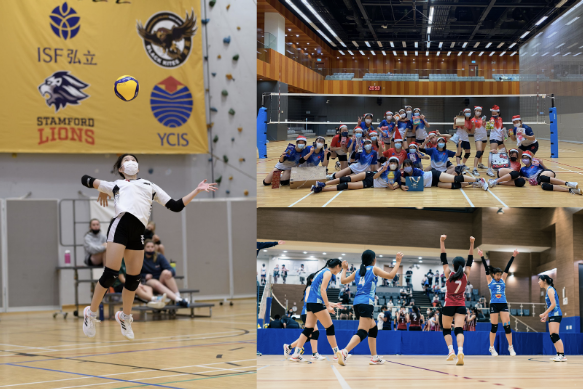More than sports - the benefits of being a student-athlete
When high school students are asked about their long-term goals, one of the most common responses is to “get good grades and be accepted into a good university.”
Yet, my current response is to be a successful student-athlete.
To provide context as to where I am coming from, I am a recipient of an academic scholarship at RCHK while simultaneously serving as a representative for the Black Kites, Victory Volleyball Club, and the Hong Kong National Youth Girls Volleyball Team. Although this may seem impressive at first glance, it comes with many unseen mental and physical sacrifices.
My typical week consists of 10 - 14 hours of training per week. When considering factors such as arriving early to practice, commuting time, and team briefing sessions post-training, this means sacrificing approximately 60 hours per week for volleyball. Placing this in the context of a school day, this translates to arriving home from 9 -11 p.m. and leaving at 7:30 a.m. for school the following day. For most students, weekends are typically reserved for rest, but for student-athletes, they have to sacrifice vital periods of rest or sleep to compensate for school tasks.
Being a student-athlete is like being a full-time student with a part-time job. RCHK teacher and former student-athlete Alan Lee has expressed the downside as being that “you lose your free time and social life, and you become more tired during the school day as you have less downtime to relax.” However, he said it was extremely worth the sacrifice and has great respect for student-athletes who can balance their school work, social life, and training.
In an Asian household, there is a fundamental belief that prioritizing academics and grades is the foundational step to future success. Year 11 student Sage Kwok, who plays in the Hong Kong Premier Youth League, has noticed that “many of his teammates often cannot train because of tutoring.” Many student-athletes end up focusing more on school and less on sports. Meanwhile, Year 11 student Warren Suen thinks it is not worth being a student-athlete because of the “time sacrifices needed to pursue a sport at a high level.” He also believes his grades will drop if he spends so much time on sports.
Being a student-athlete comes with many benefits. Firstly, it teaches many lessons and greatly develops your character. These transferable skills will help you greatly in life, work and relationships, etc. In sports, showing up to practice every day and working hard is an act of discipline. You don’t need instant gratification since you’re focused on long-term success. Outside of sports, you need excellent time management and discipline to complete your homework and prepare for assessments.
Secondly, being a student-athlete teaches numerous interpersonal skills. In team sports, everyone must share the same goal, work hard, and contribute their part to achieve a good result. It helps you learn how to work with different people with different personalities. Furthermore, being a team player means working hard not only for yourself but for the team as well. This helps you not only better yourself but also those around you. 55% of the top companies’ female executives are former student-athletes because sports inculcate the interpersonal skills and versatility needed in the workplace.
One thing that has proven extremely valuable to me as a student-athlete is the coaches and teammates surrounding me. They are the ones who push and encourage you to do your best. Kwok also mentioned the impact of his coach on his attitude. “Having a good attitude is so important because no matter how much skill an athlete has, you have to be willing to work hard and learn more,” said Kwok.
Being a student-athlete is hard, and if you struggle with time management, here are a few tips to help you with your academics and mindset.
Pay attention in class - this seems obvious, right? Well, that’s the most fundamental step. Being an active listener in class is much more efficient than catching up on content at home.
Utilize your time well - having good time management is a must, it is essential to use your lunch and break times to catch up on mini assignments. During commuting times, I like to review my notes or do work on my iPad, and it has saved me lots of time.
Remember your “why” - it is given that being a student-athlete is difficult. You must learn to make sacrifices, and that’s a huge part of growing up. It is crucial to enjoy your sports innately to make it worthwhile. Remember why you fell in love with it in the first place.
Ultimately, the benefits you get exceed the cons. From my experience, I learned many life lessons and soft skills such as resilience, having a good attitude on and off the court, and sportsmanship, all of which I never would’ve learned in school. Most importantly, sports will mold you into a better person.
No journey is easy, but that’s the beauty of it. Do not choose to give up just because it’s hard. Looking back and knowing you have worked hard for everything you deserve is an accomplishment in itself. With failure and difficulty comes wisdom and the opportunity for success, and it is up to you to decide how you want your journey to look like.
